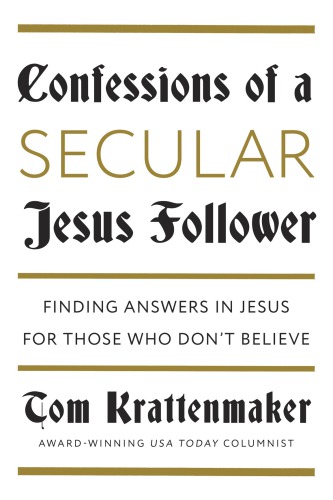
Confessions of a Secular Jesus Follower
Finding Answers in Jesus for Those Who Don't Believe
کتاب های مرتبط
- اطلاعات
- نقد و بررسی
- دیدگاه کاربران
نقد و بررسی

August 8, 2016
Krattenmaker (Onward Christian Athletes) was raised Catholic; he later stopped believing in the supernatural aspects of Christianity but still admired Jesus greatly as a role model. Asking what rock we should tether ourselves to in life, Krattenmaker makes a strong case for Jesus, not as a resurrected messiah or god, but as an ethical teacher and guide. Humanists and atheists have much to learn from this sage, Krattenmaker argues, and he spends his book outlining the basics of Jesus’s ethics. Most of this, with its emphasis on the loaves and the fishes (abundance), the Sermon on the Mount (radical nonviolence), and the good Samaritan (caring for others), will be familiar to anyone with an interest in or some exposure to Christianity, but for someone new to these stories or with a skeptical outlook, Krattenmaker’s book fills a gap. Krattenmaker is strongest when he marshals facts and figures to explain problems, such as overcrowding within the U.S. prison system, weakest when he talks about himself, but overall he offers a reasoned guide that makes a 2,000-year-old story relevant to secularists today. Agent: Wes Yoder, Ambassador Agency Inc. (Oct.)
This review has been corrected. It previously listed the incorrect agent for the author.

How to follow Jesus without believing in him.USA Today columnist Krattenmaker (The Evangelicals You Don't Know: Introducing the Next Generation of Christians, 2013, etc.), the communications director at Yale Divinity, sticks close to his self-identity as a nonbeliever. Though he does not proclaim himself an atheist, he is indeed a secularist. Despite this, he finds in Jesus a role model of the highest order, and he attempts to convince his fellow secularists that Jesus is worth listening to, even worth following, so long as you don't call it "religion." Krattenmaker comes across as an almost stereotypical coastal liberal, working at Yale, with roots in Portland, Oregon, and a view of Christianity as something steeped in myth. Though he pokes fun at himself in this vein, the reality remains that he comes to his topic with a very defined worldview. He prides himself on having gotten to know some evangelical Christians, who were not as bad as he feared, but he still thinks they are wrong to have religious faith in Jesus. As a teacher of ethics and morality, however, Jesus is an unsurpassed example for the human race. Jesus' words in the New Testament are not sacred to Krattenmaker but are indeed worth utilizing for daily ethical dilemmas. "When it comes to a secular engagement with Jesus," he notes, "we can pick and choose, accept and reject, mix and match, however we wish." The author stands in a difficult position. To nonbelievers, he will come off as a Christian. No matter how much he protests, the reality is that many self-professed Christians are just as unconvinced as he is of the supernatural aspects of Jesus' story. Yet to many committed Christians, he will seem to be appropriating what they hold dear for his own purposes. Though the author is right to find moral bearings in the teachings of Jesus, his argument that one can follow Jesus yet not believe in him falls flat. COPYRIGHT(1) Kirkus Reviews, ALL RIGHTS RESERVED.

October 1, 2016
Krattenmaker, a columnist for USA Today and author of The Evangelicals You Don't Know, is a bit playful with the title of his latest work, as "Jesus follower" would be a secular version of "Christian" and the confessions have more in common with the Augsburg Confession than autobiography. The author puts forth a compelling portrait of Jesus stripped of theological trappings and sentimentality. Taking on societal ills such as the plight of the downtrodden or marginalized, Krattenmaker invokes the openness of Christ. In cases of power or violence, we see Jesus the subversive. What drives this confession is a savior who is impossibly good and vividly real in the face of our brokenness. Apart from frequent disavowals of any theological convictions, this work is akin to those by authors such as Jim Wallis. However, other writers are informed by a larger theological framework. Krattenmaker recognizes this and, at one point, attempts to demythologize this framework. Here, he falters somewhat. Reworking an interpretation of Jesus should require rethinking our understanding of His character. VERDICT Krattenmaker offers secular and religious readers a striking study of Jesus that could serve as a source of common ground and common cause.--JW
Copyright 2016 Library Journal, LLC Used with permission.

August 1, 2016
Yale Divinity School communications director Krattenmaker doesn't believe in the supernaturalnot in miracles or divine guidance and intervention or sin or, indeed, God. Yet he is an enthusiastic follower of Jesus, whose teachings, by word and deed, are simply the best he knows for dealing with the human condition. He sticks to Jesus' words and deeds as he applies them to common human failings including xenophobia, violence, sexual misbehavior, anxiety, egocentricity, craving success, callousness, and winning at all costs. He considers those failings on both the micro and macro scales. For instance, vengeance, at the level of society, is the American mania for incarceration, and callousness, ignoring the victims of injustice. Throughout, but especially in the concluding chapters, he argues for understanding Jesus secularly because there is no one and no thing to stop you and following him for the sake of doing the principled, idealistic thing. Writing as plainly and commonly as you'd expect of a USA Today columnist, Krattenmaker universalizes Jesus more, possibly, than any religion could.(Reprinted with permission of Booklist, copyright 2016, American Library Association.)

























دیدگاه کاربران